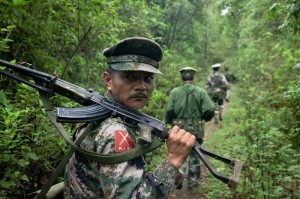Obama’s Upcoming Visit Provides Hope and Potential Danger for Burma’s Transition
By Burma Partnership • November 12, 2012 One of the first things that re-elected US President Barack Obama announced was a visit to Burma to coincide with the East Asia Summit in Phnom Penh. While it is true that the possibility of such a visit shows the progress Burma has made, it is also dangerous in that it bestows an excessive amount of legitimacy on a military backed government that continues to commit grave human rights violations, particularly in ethnic areas.
One of the first things that re-elected US President Barack Obama announced was a visit to Burma to coincide with the East Asia Summit in Phnom Penh. While it is true that the possibility of such a visit shows the progress Burma has made, it is also dangerous in that it bestows an excessive amount of legitimacy on a military backed government that continues to commit grave human rights violations, particularly in ethnic areas.
While President Obama is in Burma, he should highlight and condemn human rights abuses, not only in Arakan State, but in all areas. Meanwhile, this would be a perfect opportunity for the US to learn of some of the unintended consequences of lifting sanctions. The huge increase in land confiscations by military elites and their cronies is dispossessing more and more people every day. The imminent rush of foreign direct investment, such as that from the US, is catalyzing this process.
It is encouraging that President Obama will meet with members of Burma’s civil society as well as the government and Daw Aung San Suu Kyi. It is also encouraging that the US is well aware of some of the pressing human rights concerns in the country such as remaining political prisoners, ongoing ethnic conflict, particularly in Kachin State, and the need for more reforms especially in the judicial sector.
In light of the acknowledgement of these concerns, it is surprising that the governments of the US and Burma held talks last week over military cooperation. Burma Army representatives are set to be invited to observe Kobra Gold, a joint US-Thai military exercise. This is the same military of which reports have emerged of its soldiers participating in the violence against Rohingyas in Arakan State. The same military that maintains offensive operations against the Kachin Independence Organization in northern Burma, which has displaced around 75,000 Kachin people, and commits human right violations such as forced labor, sexual violence, torture and extra judicial killing.
For the people of Burma, particularly those in the ethnic regions who continue to live in fear of the Burma Army, the visit of President Obama and the talks of military cooperation appear as a symbol that they are being forgotten. In President Obama’s acceptance speech of his Nobel Peace Prize, he stated, “When there is genocide in Darfur; systematic rape in Congo; or repression in Burma – there must be consequences.” Yet systematic rape is happening in Kachin State and repression is happening throughout Burma, but the only consequences seem to be rewards.
President Obama’s visit is in good faith. The stated aims of preventing the backsliding of progress and offering encouragement to reformers is commendable. It is, however, excessive and premature. As Aung Zaw, editor of the exiled news outlet, The Irrawaddy, states, “the ethnic minorities, all the voices from the affected areas (have) started to question the visit. They feel it’s premature to visit because they think that the president can wait until 2014, when Burma is going to be holding an ASEAN summit… people feel that it’s too fast to visit Burma this time.” A much stronger message from the US to the ethnic nationalities would be to wait until the government had committed to an inclusive, political dialogue with ethnic groups. This is the real kind of progress that deserves to be rewarded.
Tags: Burma Partnership, United States, US President Barack ObamaThis post is in: Blog
Related PostsBurma Partnership Celebrates Continuing Regional Solidarity for Burma and Embraces the Work Ahead for Progressive Voice
Burma Army Displays Blatant Disregard for 21st Century Panglong Peace Process
Ann Din Coal Power Plant: Local Movement and Action to Preserve and Protect Natural Resources and Land: Mon IDP Report Case Study #4
Latest Human Rights Abuse Case Demonstrates Urgent Need to Reform the Myanmar National Human Rights Commission
Human Rights Far From Guaranteed as US Sanctions on Burma Are Removed









 All posts
All posts